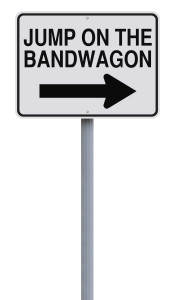Part 6 in our “Cognitive Bias and Leadership”
 On our January 16, 2013 blog, I gave an overview of cognitive bias (our tendency to filter information through our own past experiences, likes, and dislikes) and surmised that it can lead to judgments that are faulty. We have been exploring how these biases affect the ability to lead and make good decisions.
On our January 16, 2013 blog, I gave an overview of cognitive bias (our tendency to filter information through our own past experiences, likes, and dislikes) and surmised that it can lead to judgments that are faulty. We have been exploring how these biases affect the ability to lead and make good decisions.
In the 6th in our series, I wanted to talk about Bandwidth Bias. This is the tendency to go with the crowd. It can also be called “groupthink” and when it turns negative, it can be a “mob mentality.” And this can happen in groups large and small. It can happen in your family, in your department or team at work, or across an entire culture.

Why does this happen?
We like to conform. We like to fit in. Consider the famous experiments by Solomon Asch, psychologist from the 1950s, who conducted experiments where participants were part of vision exercise where they had to gauge line lengths and compare them. Participants made these assessments in a group with others. Although these “others” were assumed to be participants, they were not. They were in on the experiment and would knowingly give incorrect answers. The result was the tendency for participants to provide incorrect answers as a result of being influenced by the intentional wrong answers of the group. In fact, 75% went along with the group at least one time with answers that were clearly not right.
What else did Asch learn from his experiment?
- The number of people present had an effect. The larger the number of people, the more people felt the need to conform.
- If even one other person gives the actual correct answer, the need to conform is lessened. Think social support.
- People cite not wanting to risk ridicule as a reason for conforming or that they doubted their own judgment
How does this impact business?
Teams can jump on the bandwagon to support team members even when they see a flaw. Or sometimes, it can cause a sudden release of similar products that are not well received in the market. It can cause the recruiting of candidates that are not as strong simply because their alma mater has prestige. Or it can cause your company to pass on the perfect candidate because they fear their extended unemployment is more meaningful than it is.
What does this mean for leadership? -
- Create a culture where employees can dissent
- Assign someone to be the devil’s advocate – not to be belligerent and petty, but to find logical arguments and unseen consequences
- Hire people in your organization that do not think like you do
- In a brainstorm or discussion, stop and ask, what can go wrong here? What contingency should we prepare for? What are other alternatives? Ask these questions even when you all agree you have the perfect answer. The goals are to get you and your team thinking critically.
Have other suggestions on how we can lead to avoid this or other cognitive biases? Comment below. We’d love to hear your ideas.
